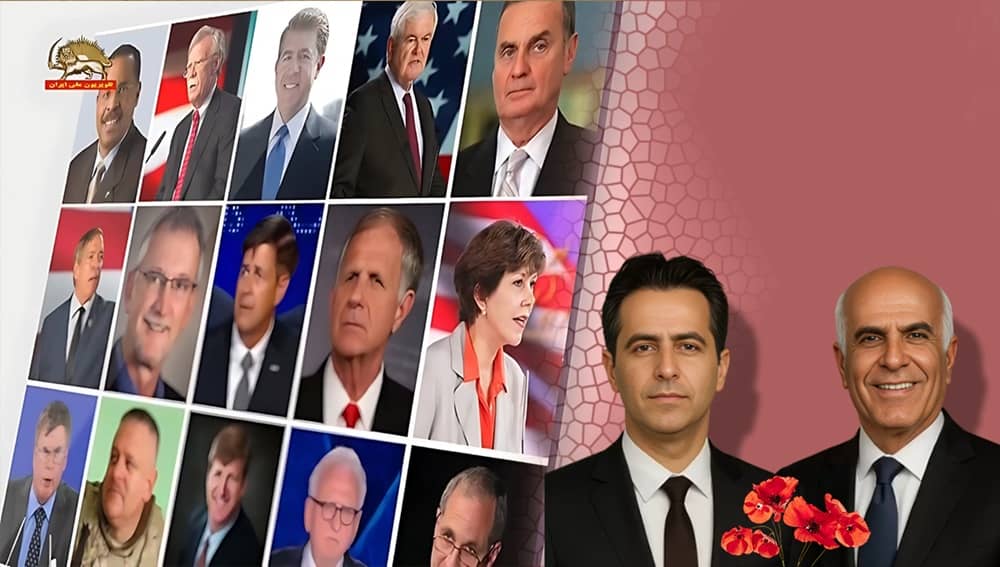Facebook
Twitter
LinkedIn
Pinterest
Reddit
Email
Print

A distinguished bipartisan group of former senior U.S. officials has issued a powerful statement urging the international community to adopt a new, decisive policy on Iran. Released on August 6, the statement, signed by figures including former House Speaker Newt Gingrich, former National Security Advisor John R. Bolton, and former NATO Commander General (Ret.) James L. Jones, condemns the regime’s escalating wave of executions and calls on world leaders to formally recognize the Iranian people’s right to resist tyranny and support the democratic alternative presented by the NCRI.
The call comes in response to the Iranian regime’s execution of political prisoners Behrouz Ehsani and Mehdi Hassani on July 27, 2025. The signatories argue that this heightened brutality is not a sign of strength, but of a regime in “panic and fear of long-lost legitimacy,” terrified of its own people and their organized resistance.
Linda Chavez: Bombs alone won’t bring change. Without regime change, Khamenei turns violence inward—torturing & executing people like #BehrouzEhsani & #MehdiHassani. We must back leaders who stand for rights—@Maryam_Rajavi offers that vision. pic.twitter.com/s6K76ZtJFR
— NCRI-FAC (@iran_policy) August 17, 2025
A Calculated Campaign of Terror
The statement details a chilling acceleration in the regime’s use of capital punishment to silence dissent. Ehsani and Hassani were executed on vaguely defined charges of “Moharebeh” (waging war against God) and membership in the People’s Mojahedin Organization of Iran (PMOI/MEK). Alarmingly, the document notes that “fourteen other affiliates of this movement face imminent execution on similar charges.”
This wave of executions is part of a broader, state-sanctioned campaign of terror. Citing United Nations data, the signatories point out that at least 612 executions occurred in Iran in the first half of 2025—more than double the number recorded during the same period in 2024.
The statement highlights the case of Saeed Masouri, Iran’s longest-held political prisoner, who has been in prison for 25 years. In a message from prison dated July 17, 2025, Masouri warned that the regime’s current actions mirror the prelude to a past atrocity. He stated that these repressive measures are “fundamentally aimed at controlling, isolating, and silencing prisoners to escalate repression and intensify executions—just as happened in 1988.”
In commemoration of the seventh day since the martyrdom of the heroic PMOI members, #BehrouzEhsani and #MehdiHassani. They stood tall, never bowed, and said a resolute “No” to the executioner.
By executing these brave freedom fighters, the religious dictatorship has laid bare its… pic.twitter.com/67zqCvnwSU
— Maryam Rajavi (@Maryam_Rajavi) August 3, 2025
A Clear Policy Recommendation for the World
Beyond condemnation, the U.S. figures offer a clear and actionable policy recommendation for the international community. They urge world governments to move beyond rhetoric and recognize the fundamental rights of the Iranian people. The statement calls on the international community to: “Recognize the right of the Iranian people to resist tyranny, pursue self-determination, and establish a democratic, secular republic.”
The signatories explicitly identify the organized opposition as the viable alternative to the current theocracy. They commend its resilience and vision, urging the world to “Commend the unwavering and relentless endeavor of the NCRI and the MEK in their effort to restore popular sovereignty to the long-suffering people of Iran.” The statement points to the NCRI’s platform, which “includes a 10-point plan and a path to a legitimate constitutional government whose legitimacy is conferred by the ballot box,” as the blueprint for a free Iran.
The statement from these American leaders represents a pivotal call for a paradigm shift in global policy toward Iran. It frames the regime’s aggression not as a problem to be managed through negotiation, but as the death throes of a failing dictatorship. Their conclusion is unambiguous: the path to a stable, peaceful, and democratic Iran lies in empowering its people and their organized movement for change. As the signatories affirm in their closing words, “We stand in solidarity with the people of Iran and their rightful struggle for freedom, dignity, and democratic governance.”